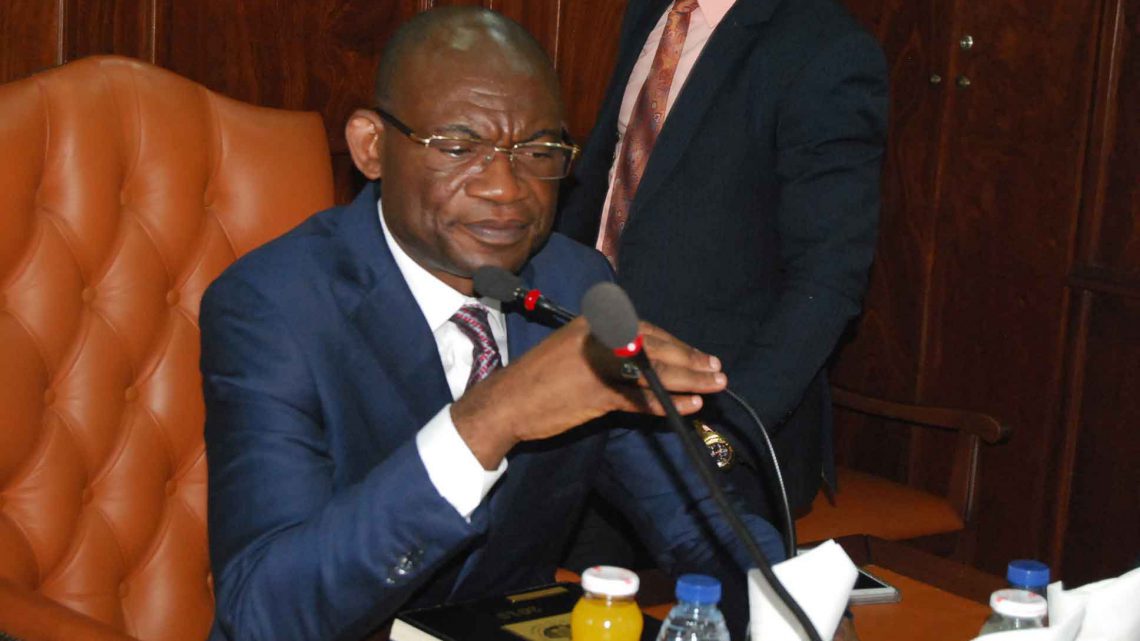Published on : 3/05/21 3:48 AM

The opening ceremony of the Expanded Budgetary Programming and Associated Performance Conferences (CEPB-PA) 2020 session had as highlights, in addition to the speech of the Minister of Economy, the presentation of two important papers, one on “Macroeconomic Context, Global Orientations of Public Policies for the Three-Year Period 2021-2023 and Challenges of the Budgetary Space” and the other on “Rationalization of Public Expenditures: Management of CAS, Arrears, Management of Subsidies to Institutions and Public Enterprises. “Presented respectively by the Director General of the Economy at MINEPAT and the Director General of the Budget at MINFI.
In his opening presentation, the Director General of the Economy at MINEPAT, Mr. Isaac TAMBA, reviewed the constraints and orientations of public policies for the next three-year period, before dwelling on the projection of the budgetary space for the period 2021-2023.
With respect to constraints, the macroeconomic context is marked at the international level by strong uncertainties in the world economy in relation to the COVID19 pandemic, which is reflected in a drop in world growth to -4.9% in 2020 compared to an increase of 2.9% in 2019; instability in the financial markets and the collapse of commodity prices, particularly oil (USD 61.4 per barrel in 2019 compared to USD 36.2 in 2020). At the national level, we should mention the decline in economic activity in connection with the health crisis, which has led to a successive revision of the growth rate; the implementation of the comprehensive socio-economic support plan linked to the response to Covid-19; the persistence of security crises; the acceleration of the decentralization process…
With regard to this environment marked by uncertainty, a series of measures is recommended to effectively guide public policies. These measures will crystallize around the structural Transformation of the economy with in particular the reinforcement of the productive apparatus through the implementation of the big projects and the promotion of the research and the innovation. Also, it will be a question of developing human capital, promoting employment and socio-economic integration; improving governance through better coordination in the implementation of public policies and the continuation of public finance reforms.
Regarding the projection of the budgetary space for the period 2021-2023, the Director General of the Economy at MINEPAT indicated that the financing of development is generally dependent on the creation of the budgetary space. This budgetary space reflects the potential for increasing public spending deemed to be a priority without jeopardizing the long-term balance of public finances. For this three-year period, 876 projects have been identified and 874 are currently being implemented. The main observations that emerge with regard to the challenges of budgetary space relate, among other things, to the opening up of available budgetary space, the approximate monitoring of projects within the administrations; some FINEX projects, particularly those financed by donations, continue to receive disbursements from donors even though they are not included in the budget law. This is generally the case for projects by GIZ, UNDP, JICA and GEF…. This can lead to non-compliance with the ceiling on disbursements and low efficiency of public spending.
At the end of his presentation, the DGEPIP recommended greater rationalization in budgetary choices and the prioritization of projects to be included in the draft budgets of each ministerial department in order to arrive at credible and realistic MTEFs.
In his presentation on the Rationalization of Public Expenditures: Management of CAS, arrears, management of subsidies to institutions and public enterprises, the Director General of the Budget, Mr. Cyrill EDOU ALO’O, enlightened the audience on the evolution and composition of public expenditures and then on the rationalization measures.
Regarding the evolution and composition of public expenditure 2021-2023, the speaker indicated that with a negative budgetary space over the period 2021-2023, i.e. -100 billion on average per year, the Government does not have any margin for the pursuit of its budgetary policy, at the risk of jeopardizing the sustainability of its financial position and the stability of the economy. Also, in the absence of budgetary margin, the Government is obliged to contain the level of its expenditure in the medium term to 17.1% of GDP between 2021 and 2023 against 19.1% in 2019 and 17.4% in 2020 (LFI) and to eliminate non-priority expenditure in order to be able to allocate the additional resources to useful expenditure.
This calls for the definition of a mechanism to rationalize current government spending (excluding salaries) for the period 2021-2023. This mechanism is the “zero value” strategy, which consists of freezing the evolution of the value of these expenditures over the next three years.
More specifically, the Director General of the Budget has stated that the rationalization measures for the period 2021-2023 are aimed in particular at controlling current consumption (water, electricity, telephone), fuel expenses, mission expenses as well as the acquisition of service or company vehicles, the envelopes of which will have to be considerably reduced; Continue the clearance of expenditure instances from previous years, in order to reduce the stock of domestic arrears of the State, including public procurement regulation fees and CARPA’s expertise costs; Give priority to redeployment and capacity building of existing staff. New recruitments should be based on relevant and budgetarily sustainable plans; Continue the rationalization of committees and commissions and abolish the remuneration allocated to working groups; Ensure strict compliance with the market price of rents contracted by the State and its dismemberments; Rationalize the subsidies granted to public establishments and companies, including other public or private organizations, by limiting them to the real and relevant needs of these entities; Respecting the management principles of the trust accounts, where applicable, in particular the systematic allocation of expenditures from these accounts by program with a clear identification of the activities to be carried out in order to achieve the objectives assigned to each program, and boosting the collection of the revenues of these accounts.